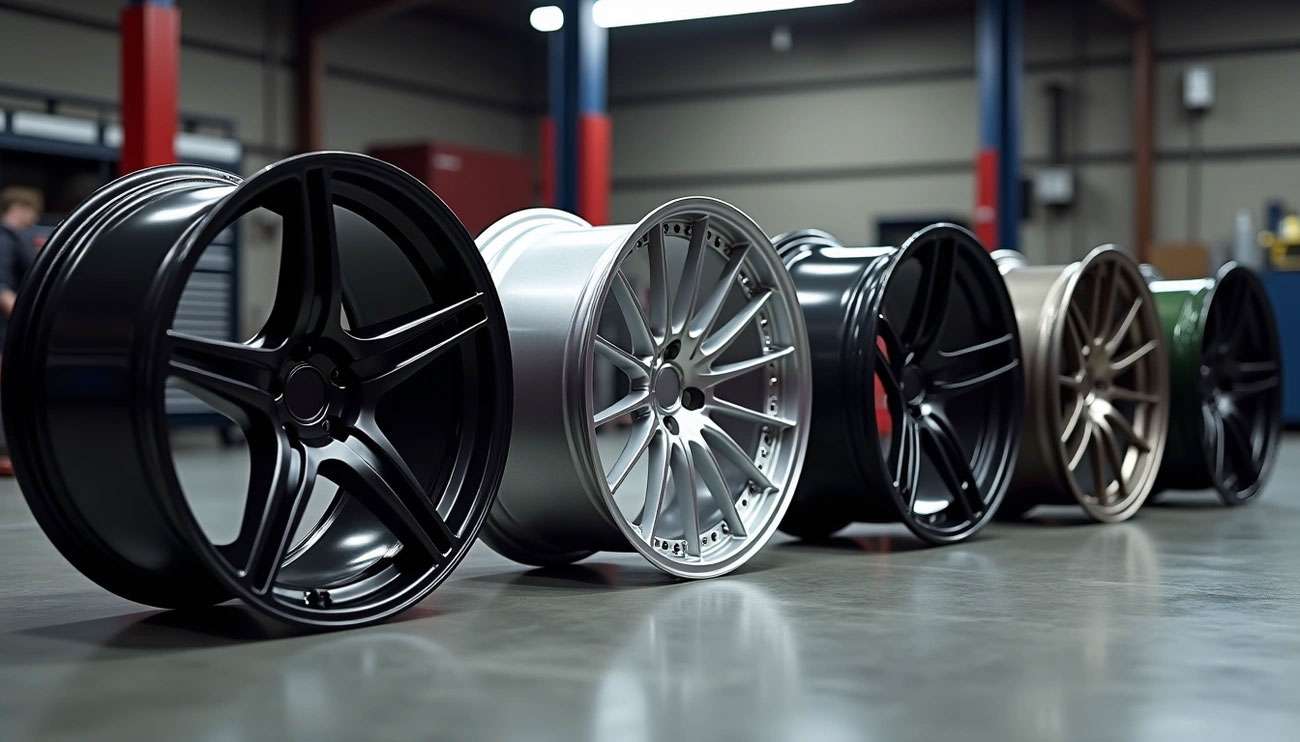
Custom wheels are a popular way to upgrade the look and performance of your vehicle. We carry the best selection of custom wheels at the lowest prices, and we've seen firsthand how dramatically pricing varies across this market. Most drivers spend around $725 for a complete wheel replacement, though custom wheels typically range anywhere from $200 to $2,000 for a complete set.
Budget-conscious drivers can find excellent options without breaking the bank. Steel rims start at just $30 per wheel, making a complete set of four available for approximately $120. However, prices climb quickly based on your specific needs and preferences.
Mid-range custom wheels generally fall between $200-$500 per set, offering the best value for most vehicle owners. High-end custom rims can exceed $1,000 each, while specialized options reach extraordinary price points. Carbon fiber wheels, for instance, command between $10,000 to $13,500 for a complete set. Custom forged wheels typically range from $170 to $680 per wheel, depending on size and construction type.
Understanding what you're paying for makes all the difference when selecting custom wheels. We'll break down exactly what you can expect at each price point and help you determine which option delivers the best performance and value for your vehicle and budget.
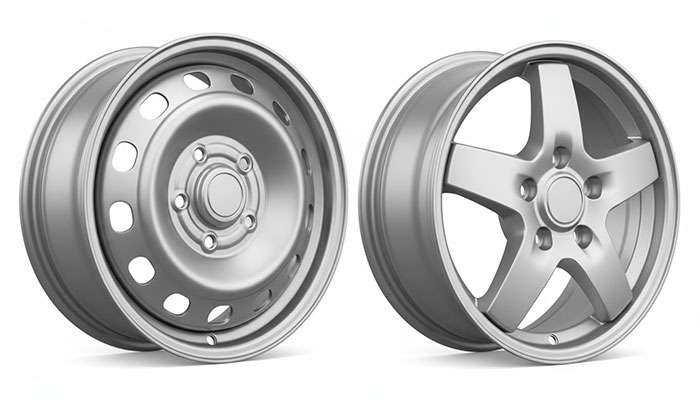
Understanding budget wheels is important before making a purchase. Steel and basic cast aluminum rims offer practical solutions for drivers who prioritize functionality and affordability. These entry-level options serve as the foundation of the custom wheel market and represent the most affordable starting point for vehicle customization or replacement.
Steel rims stand out as the most basic wheel option available. Made primarily from an iron and carbon alloy, steel wheels are manufactured through a stamping technique using warm-rolled steel. Modern steel wheels utilize high offset yield strength exceeding 600 MPa, contributing to their exceptional durability.
Basic cast aluminum rims are created through a casting process that takes advantage of aluminum's lower melting point compared to iron. This manufacturing approach allows for more creative designs than what's possible with steel. Among aluminum options, cast wheels are the most affordable type, while forged aluminum represents the premium tier with rotary-forged falling somewhere in between.
When it comes to budget wheels, material selection makes all the difference:
Steel excels in strength and simplicity
Aluminum provides lighter weight and better corrosion resistance
Both materials can be chrome-plated for enhanced appearance
Steel wheels focus primarily on functionality rather than appearance, appealing to practical-minded drivers who prioritize reliability over style. However, many budget steel wheels come with hub caps to improve their visual appeal.
Steel Rims Advantages:
Nearly indestructible without tremendous force—extremely difficult to crack or bend
Outstanding durability in harsh conditions and rough terrain
Most affordable wheel option available on the market
Simple to repair when damaged
Better traction on snowy or icy roads
Impressive load capacity—some models support up to 1600 lbs
Steel Rims Limitations:
Substantially heavier than aluminum alternatives—approximately 2.5-3x more weight
Limited design choices compared to alloy wheels
Less corrosion resistant than aluminum
Reduced acceleration and fuel economy due to extra weight
Fewer size options—most available only in 16-inch diameter
Basic appearance without wheel covers
Basic Cast Aluminum Advantages:
Lightweight construction minimizes unsprung mass
Improved handling response and fuel efficiency
Wide variety of creative, eye-catching designs
Generally more visually appealing than steel wheels
Better corrosion resistance compared to steel
With proper maintenance, maintains its shine
Basic Cast Aluminum Limitations:
More expensive than steel options
Minor damage can significantly affect appearance
Damaged wheels typically require complete replacement
Less durable than steel when encountering potholes or curbs
Steel wheels represent the absolute bottom of the price spectrum. These basic wheels typically range from $50 to $200 per wheel, with complete sets of four rims priced between $200 and $800. At the very lowest end, you might find basic steel replacement rims for as little as $30 each or approximately $120 for a complete set of four.
Cast aluminum wheels occupy the next tier up, with prices generally starting around $100 per wheel. Basic aluminum rims are typically priced between $50 and $200 each, although decent aluminum rims can often be found for around $150 each or less. Complete sets of budget aluminum wheels frequently range from $200 to $800 total.
Several factors affect pricing even within these budget categories:
Size: Larger diameter wheels command higher prices
Finish: Chrome plating or special paint finishes add cost
Brand: Name-brand wheels typically cost more than generic options
When comparing OEM (original equipment manufacturer) versus aftermarket options, aftermarket wheels can sometimes be cheaper when replacing OEM wheels, though quality varies significantly.
Steel wheels perform exceptionally well in specific situations where their unique characteristics provide clear advantages:
Winter Driving - The heavier weight improves traction on snow and ice. Many drivers switch from alloy to steel wheels during winter months specifically because steel wheels resist damage from road salt, chemicals, and winter hazards.
Off-Road Adventures - When tackling rough terrain, steel wheels provide unmatched durability against rocks, ruts, and obstacles. Their resistance to bending and cracking makes them ideal for off-road enthusiasts.
Heavy-Duty Applications - Trucks and commercial vehicles benefit from steel's superior load capacity. The robust construction handles heavy payloads without compromising safety or reliability.
Classic Car Restoration - Many vintage vehicles originally came with steel wheels. Authentic restoration projects often require steel rims to maintain period-correct appearance and specifications.
Basic cast aluminum wheels serve different purposes where their characteristics shine:
Daily Commuting - The lighter weight improves fuel economy over steel wheels while offering more style options than basic steel. Cast aluminum represents a practical upgrade for everyday drivers.
Budget-Conscious Style Upgrades - Drivers who want enhanced appearance without premium pricing find cast aluminum offers the best compromise. The wider design variety allows for personalization without breaking the bank.
Seasonal Wheel Swapping - Many drivers maintain separate wheel sets for summer and winter. Cast aluminum provides an affordable option for a second set of wheels when paired with seasonal tires.
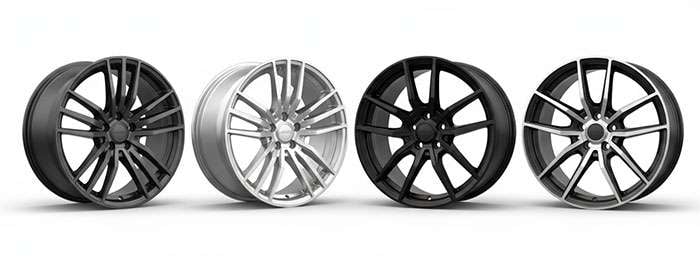
Mid-range aluminum and alloy wheels occupy the sweet spot where performance meets affordability. These wheels represent where most drivers find their ideal balance of quality, style, and value. Understanding what distinguishes mid-range options from budget and premium alternatives helps you make informed decisions about your wheel investment.
Aluminum alloy wheels combine aluminum with other metals—typically magnesium, silicon, or nickel—creating a material that outperforms basic cast aluminum. This metallic fusion produces wheels with superior properties compared to single-metal construction.
Flow-formed construction represents a significant advancement in manufacturing technology. This process involves applying pressure to a cast wheel while it spins, stretching and compressing the barrel to enhance molecular structure. The result is a wheel that's lighter and stronger than conventional cast options without reaching premium forged pricing.
Mid-range wheels typically feature:
Weight reduction of 25-30% compared to steel
Improved heat dissipation from brake systems
Enhanced corrosion resistance with quality finishes
Broader design variety than budget options
The manufacturing precision at this level produces wheels with better dimensional accuracy. This translates to smoother operation, reduced vibration, and improved overall driving experience compared to entry-level alternatives.
Mid-Range Rims Advantages:
Lightweight construction improves handling, acceleration, and braking
Excellent heat management prevents brake fade during demanding driving
Superior corrosion resistance maintains appearance over time
Wide variety of designs suits different vehicle styles and preferences
Better fuel efficiency than steel wheels due to reduced rotational mass
Quality finishes resist chipping and damage better than budget options
Flow-formed options deliver near-forged performance at lower cost
Mid-Range Rims Limitations:
Less durable than steel in severe impact situations
Higher initial investment than budget wheels
Requires more maintenance to preserve appearance
Damage often necessitates complete wheel replacement
Not as strong as forged wheels for extreme performance applications
Mid-range aluminum and alloy wheels typically range from $140 to $550 per wheel. For a complete set of four wheels, expect to invest between $560 and $2,200. This price point delivers significant performance improvements over budget options without approaching premium pricing.
Flow-formed wheels, which offer enhanced strength through specialized manufacturing, generally cost between $170 and $400 per wheel. These represent excellent value, providing performance characteristics closer to forged wheels at roughly half the price.
Price variations within the mid-range category depend on several factors:
Construction method: Flow-formed costs more than standard cast
Wheel diameter: Larger sizes command premium pricing
Finish complexity: Multi-tone and specialty finishes increase cost
Brand reputation: Established manufacturers typically charge more
Name-brand mid-range wheels often justify their pricing through superior quality control, better warranty coverage, and proven performance records. Generic alternatives may offer lower prices but sometimes compromise on manufacturing precision and material quality.
Mid-range aluminum and alloy wheels excel in situations where balanced performance matters:
Daily Performance Driving - The reduced unsprung weight improves handling response and ride quality. Drivers who enjoy spirited driving on public roads find mid-range wheels deliver noticeable improvements without premium costs.
Sport Compact Cars - Vehicles like the Honda Civic Si, Subaru WRX, or Mazda MX-5 benefit significantly from quality lightweight wheels. Mid-range options complement these vehicles' performance characteristics without overwhelming their budgets.
Luxury Sedan Upgrades - Owners of premium sedans who want to personalize their vehicles find mid-range wheels offer sophisticated designs that enhance appearance while maintaining ride quality.
Weekend Track Use - Enthusiasts who participate in occasional track days appreciate the performance benefits of lightweight wheels. While not as extreme as forged racing wheels, quality mid-range options handle track demands for casual use.
Style-Conscious Drivers - The extensive design variety in this category allows for significant personalization. Drivers who value appearance alongside performance find mid-range wheels deliver both without compromise.
Climate-Conscious Applications - The superior corrosion resistance makes these wheels ideal for coastal areas or regions with harsh winters. Quality finishes withstand salt exposure better than budget alternatives.
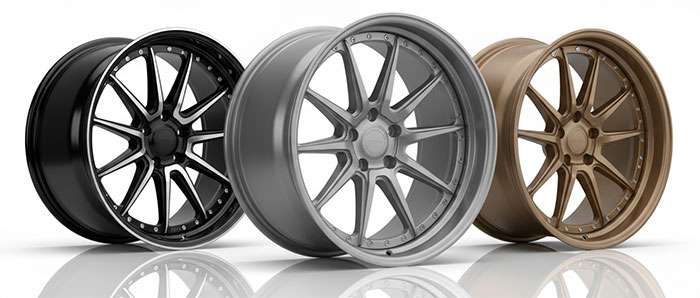
Forged aluminum wheels represent a significant step up in engineering and performance. These premium options utilize advanced manufacturing processes that create wheels with exceptional strength-to-weight ratios. Understanding what makes forged wheels worth their premium price helps you decide whether this investment aligns with your performance goals.
The forging process transforms aluminum through extreme pressure and heat. Unlike casting, which pours molten metal into molds, forging compresses solid aluminum billets under tremendous force—up to 10,000 PSI. This process aligns the metal's grain structure, creating a denser, stronger material with superior mechanical properties.
Forged aluminum wheels offer distinct advantages over cast alternatives:
Significantly stronger material structure resists impacts and stresses
Reduced weight while maintaining or exceeding structural integrity
Enhanced heat dissipation properties for demanding driving conditions
Superior dimensional accuracy for precise fitment
The manufacturing precision enables thinner spoke designs and more intricate patterns without compromising strength. This creates wheels that look distinctive while delivering measurable performance benefits.
Many premium forged wheels feature additional manufacturing processes:
Rotary forging (flow-forming) combines benefits of casting and forging
Multi-piece construction allows for custom width and offset combinations
CNC machining produces perfect dimensional tolerances
Forged Aluminum Advantages:
Exceptional strength-to-weight ratio delivers maximum performance
Significant weight reduction improves acceleration, braking, and handling
Superior heat management prevents brake fade under extreme conditions
Enhanced durability withstands track use and aggressive driving
Precise manufacturing ensures perfect balance and minimal vibration
Extensive customization options for offset, width, and finish
Multi-piece designs allow for repairs rather than complete replacement
Higher resale value compared to cast wheels
Forged Aluminum Limitations:
Significant initial investment required
Extended lead times for custom orders
Performance benefits most noticeable in demanding driving situations
Higher profile makes them attractive theft targets
Some designs sacrifice practicality for appearance
Forged aluminum wheels command premium pricing due to their advanced manufacturing and superior performance characteristics. Custom forged wheels typically range from $170 to $680 per wheel, with complete sets priced between $4,000 and $8,000.
Single-piece forged wheels generally cost between $500 and $1,000 per wheel. These represent the entry point for forged construction, offering significant performance improvements over cast options while maintaining more accessible pricing than multi-piece designs.
Multi-piece forged wheels push into higher price brackets, with individual wheels costing $1,000 to $2,000 or more. These complex designs allow for extensive customization and typically feature:
Separate center, inner barrel, and outer barrel components
Adjustable width and offset specifications
Multiple finish options for different wheel components
Serviceable construction for long-term maintenance
Rotary-forged (flow-formed) wheels occupy the middle ground between premium cast and full forged pricing. These typically range from $170 to $400 per wheel, offering improved strength and reduced weight compared to standard cast wheels at lower cost than traditionally forged options.
Custom specifications add to base pricing. Factors that increase costs include:
Unusual sizes or fitments requiring special tooling
Complex multi-tone or specialty finishes
Custom center caps or hardware
Expedited production timelines
Forged aluminum wheels deliver their greatest value in specific applications:
Track-Focused Vehicles - The combination of reduced weight and enhanced strength makes forged wheels ideal for track days and racing applications. Every pound of unsprung weight reduction translates to improved lap times and better handling response.
High-Performance Sports Cars - Vehicles like the Porsche 911, Corvette, or BMW M models benefit significantly from forged wheels. These cars already feature sophisticated suspension systems that allow drivers to appreciate the performance advantages forged wheels provide.
Autocross and Time Attack - Competitive driving events where tenths of seconds matter reward the investment in forged wheels. The reduced rotational mass improves acceleration out of corners and quickens directional changes.
Serious Off-Road Racing - Desert racing and competitive off-road events demand wheels that can withstand extreme impacts while maintaining minimal weight. Forged construction handles these harsh conditions better than cast alternatives.
Luxury Vehicle Personalization - Owners of high-end luxury vehicles who want custom fitment and distinctive styling find multi-piece forged wheels offer unmatched customization options. The investment aligns with the vehicle's overall value.
Enthusiast Builds - Dedicated automotive enthusiasts who invest significant time and money in their vehicles often choose forged wheels to maximize performance potential. The wheels complement other performance modifications.
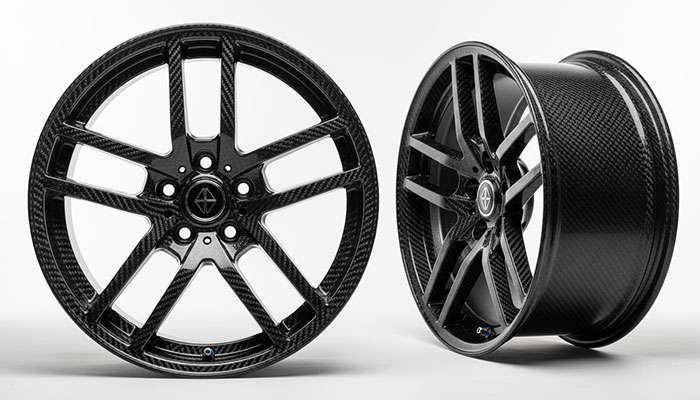
The pinnacle of wheel technology combines exotic materials, complex manufacturing, and extreme engineering. High-end wheels represent the ultimate in performance and exclusivity, with pricing that reflects their specialized nature. These wheels typically appear on exotic supercars, professional racing vehicles, and ultra-luxury applications where cost takes a back seat to performance and distinction.
Carbon fiber wheels represent the cutting edge of wheel technology. These wheels utilize the same advanced composite materials found in aerospace and Formula 1 racing. The manufacturing process involves laying up multiple layers of carbon fiber fabric, impregnating them with resin, and curing under precise temperature and pressure conditions.
The material properties of carbon fiber deliver extraordinary performance characteristics:
Exceptional strength-to-weight ratio surpasses all metal alternatives
Weight reductions of 40-50% compared to aluminum wheels
Superior vibration damping improves ride quality
Distinctive visual appearance with visible carbon weave
Three-piece forged wheels represent another category of ultra-premium options. These complex designs feature separate components:
Forged aluminum center section
Inner barrel (typically forged or spun aluminum)
Outer barrel (forged or spun aluminum)
The modular construction enables extensive customization impossible with one-piece designs. Owners can specify exact widths, offsets, and finish combinations for each component. This level of customization allows for perfect fitment on vehicles with unique suspension setups or aggressive stance requirements.
Carbon Fiber Advantages:
Extraordinary weight reduction improves every aspect of vehicle performance
Superior vibration control enhances ride comfort
Distinctive aesthetic appeal unavailable with metal wheels
Advanced material technology represents cutting-edge engineering
Excellent brake heat management in racing applications
Reduced gyroscopic effect improves steering response
Carbon Fiber Limitations:
Exceptional cost investment—$10,000 to $13,500+ per set
Reduced impact resistance compared to forged aluminum
Limited repair options if damaged
Not suitable for winter driving or rough road conditions
Specialized mounting procedures required
3-Piece Forged Advantages:
Ultimate customization possibilities for width, offset, and finish
Serviceable design allows component replacement rather than full wheel replacement
Ability to rebuild wheels with different specifications
Distinctive appearance with visible multi-piece construction
Premium materials and craftsmanship throughout
3-Piece Forged Limitations:
Significant investment—typically $1,500 to $4,000+ per wheel
Extended production timeframes, often 8-12 weeks or longer
Regular maintenance required to check hardware torque
Potential for air leaks if seals deteriorate
Carbon fiber wheels command the highest prices in the wheel market. Complete sets typically range from $10,000 to $13,500, though some exotic applications exceed $15,000. Individual carbon fiber wheels cost between $2,500 and $3,500 each, with larger diameters and complex designs pushing toward the upper end of this range.
The manufacturing complexity of carbon fiber wheels justifies their pricing. Each wheel requires extensive hand labor, precise material layup, controlled curing cycles, and meticulous quality control. Production volumes remain limited due to specialized manufacturing requirements.
Three-piece forged wheels vary widely in price based on specifications:
Entry-level 3-piece forged sets: $6,000-$10,000
Premium 3-piece forged sets: $10,000-$16,000
Ultra-premium custom 3-piece sets: $16,000-$31,400+
Individual 3-piece forged wheels typically cost between $1,500 and $4,000 each, depending on:
Wheel diameter and width specifications
Center design complexity
Finish options for each component
Hardware specifications (titanium fasteners add significant cost)
Brand prestige and manufacturing location
Custom specifications substantially increase base pricing. Complex finishes, unusual sizes, or expedited production can add 25-50% to standard costs.
High-end wheels serve specific, demanding applications:
Exotic Supercars - Vehicles like Ferrari, Lamborghini, McLaren, and Bugatti benefit from the extreme weight reduction carbon fiber provides. These cars feature suspension and brake systems designed to exploit every performance advantage.
Professional Racing - Carbon fiber wheels appear in various racing series including endurance racing, time attack, and professional drifting. The weight savings directly translate to faster lap times and improved competitive performance.
Track-Dedicated Supercars - Purpose-built track cars like the Porsche GT3 RS or McLaren 765LT gain significant benefits from carbon fiber wheels. These vehicles maximize the performance potential of lightweight wheel technology.
Ultra-Luxury Applications - High-end luxury vehicles sometimes feature carbon fiber wheels as ultimate expressions of exclusivity. The distinctive appearance and cutting-edge technology align with ultra-luxury vehicle positioning.
Competitive Time Attack - Serious time attack competitors seeking every possible advantage invest in carbon fiber wheels. The combination of reduced weight and improved heat management helps achieve record lap times.
Three-piece forged wheels serve different high-end applications:
Custom Stance Builds - Vehicles with aggressive fitment requirements benefit from the unlimited customization options 3-piece wheels provide. Precise offset and width specifications enable perfect wheel-to-fender gaps.
Show Cars - Display vehicles that prioritize appearance often feature elaborate 3-piece designs with multiple finish combinations. The distinctive appearance and craftsmanship make them ideal for show applications.
Luxury Performance Sedans - High-end sedans like the Mercedes-AMG S65 or BMW M760i can accommodate custom 3-piece wheels that provide both performance and distinctive styling.
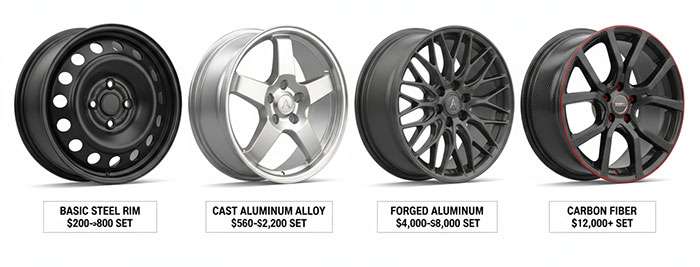
Understanding what drives wheel pricing helps you evaluate options and make informed decisions. Multiple factors contribute to the final cost of custom wheels, from raw materials to manufacturing complexity. Breaking down these elements reveals why seemingly similar wheels can have dramatically different price tags.
Material selection represents the single largest influence on wheel pricing. The manufacturing process amplifies these cost differences even further.
Steel Construction - Steel remains the least expensive option due to abundant raw materials and straightforward manufacturing. The stamping process requires minimal specialized equipment and produces wheels quickly and efficiently.
Cast Aluminum - Pouring molten aluminum into molds costs more than steel stamping but less than forging processes. Cast aluminum represents the entry point for lightweight wheel construction.
Flow-Formed (Rotary-Forged) - This hybrid process applies pressure to cast wheels while spinning, compressing the barrel section. The additional manufacturing step increases costs but delivers improved strength and reduced weight compared to standard casting.
Forged Aluminum - Forging requires massive hydraulic presses and significant energy input. The process takes longer and produces fewer wheels per hour compared to casting. These factors contribute to substantially higher costs.
Multi-Piece Construction - Assembling wheels from separate components requires additional manufacturing steps, precision machining, and specialized hardware. Each piece must meet exacting tolerances before assembly.
Carbon Fiber - Exotic material costs, complex layup procedures, controlled curing cycles, and extensive quality control create the highest production costs in the wheel industry.
Wheel dimensions directly impact material requirements and manufacturing complexity:
Diameter - Larger diameter wheels require more material and often feature more complex spoke designs to maintain structural integrity. Common sizes range from 15 inches to 22+ inches, with prices increasing significantly at the upper end.
Width - Wider wheels use more material and require stronger construction to resist lateral forces. Racing applications sometimes use wheels exceeding 13 inches in width, commanding premium pricing.
Offset and Backspacing - Custom offset specifications require different tooling or manufacturing setups. Non-standard offsets typically cost more than common fitments.
Bolt Pattern - Unusual bolt patterns or patterns requiring specific PCD (pitch circle diameter) dimensions may require custom manufacturing, increasing costs.
Surface treatments and finishes significantly affect final wheel pricing:
Basic Painted Finish - Single-color paint represents the most affordable finish option. Standard colors like silver, black, or gunmetal typically cost less than special colors.
Powder Coating - More durable than paint, powder coating involves electrostatically applying dry powder before curing in ovens. The process costs more but provides superior durability.
Chrome Plating - Electroplating chrome creates mirror-like finishes but requires multiple process steps including copper plating, nickel plating, and final chrome application. Chrome typically adds $200-$600 per wheel.
PVD (Physical Vapor Deposition) - Advanced coating technology creates extremely durable finishes in various colors. PVD processes cost more than conventional finishing but provide superior longevity.
Multi-Tone Finishes - Wheels featuring different colors on face, lip, and spokes require multiple masking and finishing operations, increasing labor costs significantly.
Brushed or Machined Accents - CNC machining to create contrast highlights or brushed surfaces adds manufacturing time and complexity.
Manufacturer reputation influences pricing through several mechanisms:
Quality Control Standards - Reputable brands invest in rigorous testing including JWL (Japan Light Alloy Wheel) certification, VIA (Vehicle Inspection Association) approval, and SAE (Society of Automotive Engineers) standards. These quality assurance processes add cost but ensure reliability.
Engineering and Design - Established manufacturers employ engineering teams to optimize wheel designs using finite element analysis and physical testing. This development cost distributes across product pricing.
Manufacturing Location - Wheels manufactured in countries with higher labor costs (Japan, Germany, USA) typically command premium pricing compared to developing markets.
Warranty Coverage - Premium brands often include comprehensive warranties covering structural integrity and finish quality. The cost of honoring these warranties factors into product pricing.
Brand Prestige - Luxury and performance-oriented brands charge premiums for name recognition and association with high-end vehicles.
Manufacturing scale significantly affects per-unit costs:
Mass Production - Common fitments for popular vehicles benefit from economies of scale. High production volumes distribute tooling costs across many units, reducing individual wheel prices.
Limited Production Runs - Specialized fitments or unique designs produced in smaller quantities carry higher per-unit costs due to tooling expenses and setup requirements.
Custom Orders - Fully custom specifications requiring unique tooling or non-standard processes command the highest prices. Custom work eliminates economies of scale entirely.
Stocking and Distribution - Readily available wheels in distributor stock cost less than special-order items requiring international shipping or extended lead times.
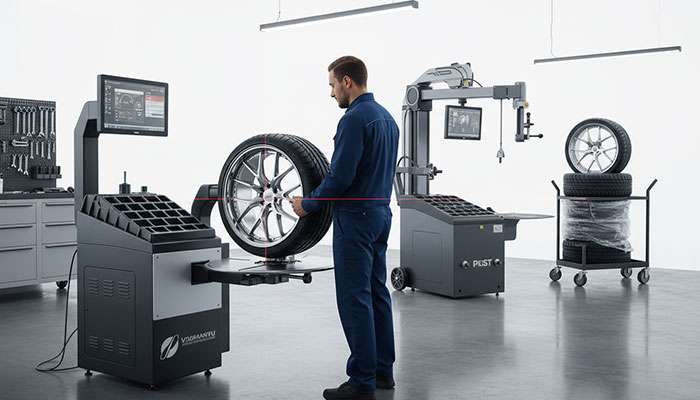
The sticker price of custom wheels represents only part of your total investment. Understanding the complete cost picture helps you budget accurately and avoid surprises during the installation process. Professional installation ensures your new wheels perform as intended and last for years to come.
Professional wheel installation involves multiple services beyond simply bolting wheels to your vehicle:
Mounting - Technicians carefully mount tires onto your new wheels using specialized tire machines. Proper mounting prevents bead damage and ensures air-tight seals. This service typically costs $15-$30 per wheel.
Balancing - Dynamic wheel balancing identifies and corrects weight imbalances that cause vibration at highway speeds. Technicians use computerized balancers and apply small weights to achieve smooth rotation. Balancing usually costs $10-$20 per wheel.
TPMS Service - Modern vehicles require tire pressure monitoring systems. Installing or transferring TPMS sensors adds $10-$25 per wheel to your costs. Some custom wheels require specific TPMS valve stems or adaptors.
Valve Stems - New valve stems prevent air leaks and maintain proper inflation. Standard rubber stems cost $3-$5 per wheel, while metal stems for high-performance applications cost $10-$20 per wheel.
Complete Installation Package - Bundled services for all four wheels typically range from $80 to $200 total, representing better value than individual services purchased separately.
Installing new wheels, especially those with different sizes or offsets than stock, often necessitates wheel alignment services:
Basic Front-End Alignment - Adjusts camber, caster, and toe on front wheels. This service typically costs $50-$75 and takes 30-60 minutes.
Four-Wheel Alignment - Comprehensive service adjusting all four wheels for optimal tire wear and handling. Expect to pay $75-$150 for this service, which requires 1-2 hours of shop time.
Performance Alignment - Specialized alignment targeting specific handling characteristics for track or spirited driving. Performance shops charge $150-$300 for detailed alignment services including corner balancing.
Proper alignment prevents premature tire wear, improves handling, and ensures your vehicle tracks straight on flat roads. Skipping alignment when installing new wheels often leads to accelerated tire wear costing more in the long run.
New wheels rarely make sense without addressing tires simultaneously:
Budget Tires - Entry-level all-season tires cost $80-$150 per tire. Complete sets run $320-$600 before installation.
Mid-Range Tires - Quality all-season or performance tires range from $150-$250 per tire, totaling $600-$1,000 for a complete set.
Premium Tires - High-performance summer tires or ultra-high-performance all-seasons cost $200-$400+ per tire, with complete sets exceeding $1,000-$1,600.
Specialty Tires - Track tires, dedicated winter tires, or ultra-high-performance options reach $300-$600+ per tire.
Many retailers offer wheel and tire packages that bundle wheels, tires, mounting, balancing, and installation at discounted prices. These packages often provide $100-$300 in savings compared to purchasing components separately.
Several additional components contribute to total costs:
Lug Nuts or Bolts - Aftermarket wheels often require specific lug hardware. Quality lug nuts cost $50-$150 per set depending on material and design. Titanium lug nuts for racing applications can exceed $300 per set.
Hub-Centric Rings - These plastic or aluminum rings ensure proper wheel centering on vehicles where wheel bore doesn't match hub diameter. Sets of four rings cost $10-$40 depending on material.
Wheel Locks - Security lug nuts with unique key patterns deter theft. Basic sets cost $20-$50, while high-security options reach $100+.
Center Caps - Custom wheels sometimes require separate center caps. These range from $20-$100 each depending on design and finish.
Wheel Spacers - Sometimes necessary to achieve proper fitment or desired stance. Quality hub-centric spacers cost $100-$300 per pair.
Ongoing maintenance ensures your wheel investment lasts:
Regular Cleaning - Quality wheel cleaners and brushes prevent brake dust buildup and maintain finish integrity. Budget $30-$100 for proper cleaning supplies.
Periodic Rebalancing - Wheels should be rebalanced when rotating tires or if vibration develops. Most shops charge $40-$80 for rebalancing all four wheels.
Finish Touch-Up - Minor curb damage can often be repaired through professional wheel refinishing services costing $75-$150 per wheel.
Torque Verification - Lug nut torque should be verified after 50-100 miles and periodically thereafter. Most shops provide this service free or for minimal cost.
Several less obvious expenses can affect your total investment:
Tire Disposal Fees - Shops charge $2-$5 per tire to dispose of old tires properly.
Sales Tax - Depending on your location, sales tax adds 5-10% to wheel and installation costs.
Shipping Costs - Online wheel purchases may involve shipping fees of $50-$200 depending on size and distance.
Return Shipping - If wheels don't fit properly, return shipping can cost $100-$300.
Suspension Modifications - Aggressive wheel fitments sometimes require fender rolling, suspension adjustments, or other modifications costing $200-$1,000+.
Mounting and balancing typically adds $80-$200 to the overall cost. Proper wheel alignment ensures optimal tire wear and handling characteristics, representing another potential expense when upgrading wheels.
Hidden costs can catch buyers off guard. These include specialized hardware, hub-centric rings, wheel sensors for modern vehicles, and potential suspension modifications to accommodate larger wheel diameters. Planning for these additional expenses up front helps avoid budget surprises when completing your wheel upgrade project.
Wheel Category |
Price Range (Per Set) |
Materials/Construction |
Key Benefits |
Main Limitations |
Best Use Cases |
|---|---|---|---|---|---|
Budget Rims |
$200-$800 |
Steel and basic cast aluminum |
Nearly indestructible steel construction |
Heavy weight affects performance |
Winter driving conditions |
Mid-Range Rims |
$560-$2,200 |
Aluminum alloys, flow-formed construction |
Lightweight improves handling |
Less durable than steel options |
Daily commuter vehicles |
Premium Rims |
$4,000-$8,000 |
Forged aluminum, multi-piece construction |
Exceptional strength-to-weight ratio |
Significant investment required |
Sports cars and performance vehicles |
High-End Rims |
$12,000-$31,400 |
Carbon fiber, 3-piece forged |
Extraordinary weight reduction |
Exceptional cost investment |
Exotic supercars |
Custom wheels offer something for every driver and budget. From practical steel options to cutting-edge carbon fiber designs, the key is matching your wheel choice to your specific needs and driving style.
We've found that most drivers get the best value from mid-range aluminum and alloy wheels. These options deliver noticeable performance improvements over stock wheels while staying within reasonable budgets. They offer the ideal balance of weight reduction, style options, and durability for daily driving.
Performance enthusiasts and luxury vehicle owners often find premium and high-end wheels worth the investment. The enhanced handling, reduced weight, and custom fitment options can transform your driving experience. However, these wheels make the most sense when you'll actually use their performance capabilities.
Remember to factor in the complete cost of your wheel upgrade. Professional installation, wheel alignment, and potentially new tires add to your total investment. Quality installation ensures your new wheels perform as intended and last for years to come.
Find your best deal on custom wheels at Performance Plus Tire, where our expert team can guide you through the selection process. We carry the best selection of wheels across all categories at the lowest prices, with financing options available to make your upgrade more affordable.
The right wheels can improve both your vehicle's appearance and performance. Choose based on your driving habits, budget, and style preferences, and you'll enjoy the upgrade every time you hit the road.
Custom wheel pricing spans an enormous range from budget-friendly to ultra-premium options, with clear performance and esthetic differences at each tier.
• Budget wheels ($200-$800/set) offer durability and affordability, with steel excelling in harsh conditions and basic aluminum providing lighter weight for daily driving.
• Mid-range wheels ($560-$2,200/set) deliver the best value for most drivers, combining aluminum's weight savings with improved performance and style options.
• Premium forged wheels ($4,000-$8,000/set) provide superior strength-to-weight ratios and customization, ideal for performance vehicles and track enthusiasts.
• High-end carbon fiber wheels ($12,000-$31,400/set) offer ultimate weight reduction and exclusivity but come with exceptional costs and limited repairability.
• Material and construction method are the primary price drivers, with forged aluminum costing significantly more than cast options due to advanced manufacturing processes.
The sweet spot for most drivers lies in the mid-range category, where aluminum alloy wheels provide meaningful performance improvements over steel while remaining accessible compared to premium forged options. Consider your driving habits, performance needs, and budget when selecting wheels, as installation and alignment costs add $80-$200 to your total investment.
Custom wheel prices can vary widely, ranging from around $500 for a budget set to over $5000 for high-end options. Mid-range aluminum alloy wheels, which offer a good balance of performance and affordability, typically cost between $560 and $2,200 for a set of four.
Materials and construction significantly impact wheel costs. Cast aluminum wheels are generally the most affordable, while forged aluminum wheels command higher prices due to their superior strength-to-weight ratio. Carbon fiber wheels represent the pinnacle of pricing, offering ultimate weight reduction but at a premium cost.
Beyond the wheel price, factor in installation costs (typically $80-$200), potential alignment needs, and specialized hardware. For a complete upgrade, also budget for new tires, which can add approximately $400 or more to the total package.
Often, aftermarket wheels provide better value than OEM options. Many aftermarket manufacturers offer lightweight materials and performance benefits not available in OEM wheels, potentially improving vehicle handling and efficiency at a lower cost.
Premium and high-end wheels offer superior strength-to-weight ratios, enhanced performance, better heat management, and extensive customization options. While costly, they can provide noticeable improvements in driving dynamics, especially for performance vehicles and track-day enthusiasts.